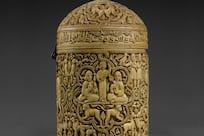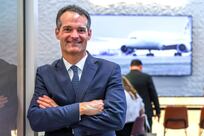MOSCOW // The two men sat in silence behind a wall of glass in a crowded auditorium, hunched over the chessboard in deep contemplation.
As the clock ticked away and their eyes carefully scanned each piece, the highest honour in the game of chess hung in the balance: the world championship title, with US$1.5 million (Dh5.5m) in prize money.
But as the reigning champion, India's Viswanathan "Vishy" Anand, took on Israel's Boris Gelfand in Moscow on Friday to kick off the month-long series of matches, some might say the game just isn't what it used to be.
The last time Moscow hosted the world championship, in the mid-1980s, chess was an extension of propaganda in a Cold War that pitted the Soviet east versus the capitalist west, and insiders versus outsiders. Chess was not just a game - it was politics.
Such was the case when Garry Kasparov, a young Armenian Jew from Baku, Azerbaijan, defeated Soviet loyalist and ethnic Russian Anatoly Karpov in Moscow in 1985, in a match that rattled the Soviet establishment.
Chess historians also relish memories of the "Match of the Century" in 1972, which saw American Bobby Fischer break a more than two decade-long Soviet domination of chess by defeating Boris Spassky in a match loaded with geopolitical meaning.
But as Mr Anand, world champion since 2007, sets out to defend his crown in a series of 12 matches this month, ideology and geopolitics are last on the agenda.
Rather than making a political statement, Mr Anand, India's first world champion, has been welcomed to Moscow by match organisers and enthusiasts as a worthy competitor with the opportunity to retain his title in what many consider to be the global chess capital.
After the first match, which ended in a draw with Mr Gelfand, Mr Anand told reporters he prefers to remain focused on the competition rather than contemplate the significance of playing in Russia's historic nerve centre. But observers say the Soviet legacy has helped shape his playing and that Mr Anand's arrival in Moscow marks an important milestone in the 42-year-old Indian's career.
"I think for Anand this [match] is a perfect opportunity, because when Vishy started to play chess, there was no tradition in India," said Mark Glukhovsky, editor of 64 - Chess Review magazine. "Twenty years ago, there were no chess schools and no trainers, and he was learning from the Soviet school of chess."
The match itself represents a homecoming of sorts for chess in Russia, which has long been considered a centre among players and enthusiasts worldwide. While the game has for several centuries been sewed into Russia's historical fabric, the country's notoriety as a chess capital skyrocketed in the 20th century, when the Soviet government tossed enormous resources toward developing the game.
As a global powerhouse, the Soviet Union trained scores of top players throughout the years, and for the Soviets, chess was a soft power tool with which to showcase the intellectual and cultural achievement of a people steaming ahead toward a communist utopia.
For nearly 30 years, and at the height of its power, the Soviet Union held the high ground, fielding the reigning world champion as it battled the United States in a race to space. Things changed when Fischer defeated Spassky in Iceland in 1972, marking a temporary end to the Soviet domination of chess.
"In Soviet times, the government played a large role in chess, and ideology was a key factor. The match between Fischer and Spassky was a prime example of this," said Kirsan Ilyumzhinov, a Russian politician and president of the World Chess Federation (FIDE).
Mr Ilyumzhinov says the Soviet legacy has left a lasting impression on chess in Russia, which is still home to many of the world's greatest grandmasters.
"In Russia, chess is not just a sport. It's a science, an art, a culture, even politics - it's everything," he said.
This, observers say, is what helped bring the title fight back to Moscow. Bolstered by a $5m donation by Russian businessman and chess enthusiast Andrei Filatov, the FIDE world championship match is aimed at showcasing Russia's rich culture - and not just in chess.
Held at the State Tretyakov Gallery, among Moscow's finest museums, the event presents a unique opportunity for visitors to absorb hundreds of years of Russian history alongside its most precious sport.
Organisers also hope the well funded event will help boost the game worldwide. Mr Ilyumzhinov says that while more people are beginning to play chess today, FIDE plans to boost the number of active players, about 6 million, to 1 billion in several years' time.
The final match of the series will take place on May 28, with a tiebreaker on May 30 if necessary.
foreign.desk@thenational.ae





